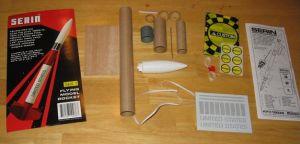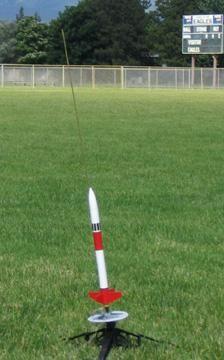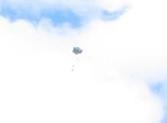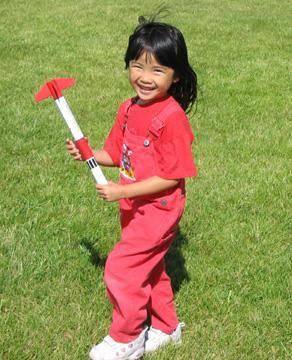| Construction Rating: | starstarstarstar_borderstar_border |
| Flight Rating: | starstarstarstarstar_border |
| Overall Rating: | starstarstarstar_borderstar_border |
| Diameter: | 0.98 inches |
| Length: | 14.30 inches |
| Manufacturer: | Custom Rockets  |
| Skill Level: | 1 |
| Style: | Sport |

Brief:
A skill level 1 quasi-missile kit with 18mm motor mount and 4 fins.
Construction:
At first glance, I found this kit very typical Custom kit, but I then noticed
that there were more pieces for a level 1 kit than other kits I have worked on.
The kit includes:
- 1 plastic nose cone
- 1 shock cord
- 2 body tubes
- 1 tube coupler
- 1 launch lug
- 4 die-cut balsa fins in one balsa sheet
- 1 sheet of decals
- 18mm engine tube
- thrust ring
- 2 centering rings
- engine hook
- 1 parachute set containing shroud lines and tape disks
- elastic shock cord
After opening the bag, I noticed that the nosecone had the typical flash at the tip. Also, the fin balsa was warped slightly and showed jagged cutting from the die cutter. Perhaps the machine blades were not quite sharp? Anyway, I will need filler work to get those fin edges smooth. Other than these two items, everything seemed to be in good order.
 I assembled the
standard 18mm engine mount assembly using Elmer's yellow wood glue. The engine
hook provided did not impress me. It was too flimsy and could bend easily--a
fact that I found when testing an engine insertion. I also had problems placing
one of the centering rings on the engine tube. Upon inspection, I found that
there was a ridge of cardboard on the inside edges, which effectively decreased
the interior diameter. An X-Acto knife carved this ridge off easily and the
ring slipped on without anymore problems.
I assembled the
standard 18mm engine mount assembly using Elmer's yellow wood glue. The engine
hook provided did not impress me. It was too flimsy and could bend easily--a
fact that I found when testing an engine insertion. I also had problems placing
one of the centering rings on the engine tube. Upon inspection, I found that
there was a ridge of cardboard on the inside edges, which effectively decreased
the interior diameter. An X-Acto knife carved this ridge off easily and the
ring slipped on without anymore problems.
Fin alignment is the Custom's standard template: simple but requiring dexterity and patience. I used the "doorframe method" to make the lines on the tube. The guide didn't have a location for the launch lug, so I put in a line centered between two fins.
The balsa sheet was warped but that didn't matter much because of the small size of the fins. After cutting through the die cut marks, I took diluted Elmer's Wood Putty to fill in the grain on the fins. It took two coats to fill and smooth the fins nicely. Next, I rounded out the upper edge, leaving the bottom and side edges flat. I guess I'm a sucker for drag effects. The fins were attached and filleted with Elmer's white glue--nothing out of the ordinary.
The upper tube assembly (the upper body tube with the coupler, nose cone and recovery system) was the last major area of the rocket. The nose cone, as mentioned before, needed to be filled and sanded. I used Squadron's White Stuff for this. The coupler attached snugly to the upper tube and friction fit well into the bottom tube. The shock cord mount is a typical tri-fold paper mount--no Kevlar® with this model. I did place the mount a little high, which forced me to cut a notch in the nose cone to accommodate the shock cord. The parachute is the standard Custom plastic chute. The shroud line needed to be cut into three equal pieces--typical for Custom. Once done, I deviated from the instructions by placing the shroud stickers onto the chute, then punching holes through the stickers, and tying loops with the shroud lines. The final knots were CA'd together. On a Custom Freedom that my youngest son is building, Custom added an extra instruction sheet telling the builder to construct the parachute shrouds this way.
Once done with the upper glue and putty work, I glued the upper body tube to the lower "engine" body tube. Here I found that the tubes did not magically line up, so I ended up having to wood putty/sand the seam to remove those unsightly lips. I also sanded out the fillets at this time.
These steps took about 3 hours to complete, though it was over a couple of days for actual construction.
Finishing:
I sprayed on a couple of mist coats of Krylon Gloss White, then two wet coats
of gloss white on the whole rocket. Once dry, I masked the areas that were to
be white with a plastic bag like the instructions said and sprayed Krylon Gloss
Red on the tail and midsection. A word of hindsight at this point: when I glued
the upper body tube to the lower body tube, I effectively made upper red/white
paint seam disappear. If you plan to make the stock color scheme, it would be
better to leave the two body tubes disconnected until the painting is done.
Next, I noticed that I made my trademark mistake and forgot the launch lug.
Gluing it into place, I then masked the red areas and sprayed white onto the
launch lug area.
 Decals were more of
a problem that what I expected. The sheet came with a protective paper stuck to
the surface of the decal sheet. Unfortunately, the glue used welded the paper
fibers to the decals. I tried to scrape the paper off but no luck. One nice
feature about the decals was that black stripes were used for the red/white
color transitions, so any paint that leaked through the mask was effectively
covered up. After the decals were place, a final spray of Krylon clear was used
to protect the finish.
Decals were more of
a problem that what I expected. The sheet came with a protective paper stuck to
the surface of the decal sheet. Unfortunately, the glue used welded the paper
fibers to the decals. I tried to scrape the paper off but no luck. One nice
feature about the decals was that black stripes were used for the red/white
color transitions, so any paint that leaked through the mask was effectively
covered up. After the decals were place, a final spray of Krylon clear was used
to protect the finish.
Construction Rating: 3 out of 5
Flight:
We finally had a good day, so out came the Serin to check out the flight
characteristics. Typical of this summer, the weather was slightly overcast and
wind gusts between 10-15 mph. Since I was getting tired of losing rockets this
year to having them being blown out of the field (3 out of 7 lost so far), I
leaned the rod into the wind about 5 degrees.
I prepped the rocket using 2 sheets of Estes wadding and a B6-4 engine for the first launch. Launch was good with a little weathercock probably due to the angle into the wind. Ejection was almost beyond visual range, except it was easy to spot since I put a lot of baby powder in the chute.

Recovery:
Descent of the rocket on the 12" parachute was typically slow. It must
have hung up there about 20 seconds before touching down before the tree line
at the edge of the field. Upon retrieval, I discovered a severe "Estes
dent" due to the 12" shock cord. The dent was strong enough to
shatter the gloss paint, putting about an 1/8" outward ding in the tube. I
definitely will have to increase this shock cord length to eliminate the
possibility of this happening again.
A second flight was set up exactly the same but this time I must have hit a thermal, since the rocket stayed up over a half minute and zipped over the trees at the end of the field to land in a thistle patch on the other side. It recovered with no damage this time, but I decided that it was enough pushing of my luck at losing rockets this day.

Summary:
As a level 1 kit, this was more work than I expected. I would almost put this
kit as a level 1.5. It is still a nice looking rocket and it really moves on a
B engine. The only other detraction is the short shock cord, which should be
increased to at least 18 inches.
Overall Rating: 3 out of 5
 |
 |
Flights
 |
 |